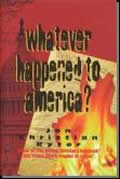AMENDING
THE CONSTITUTION BY ERASER
PART 1 of 3
By
Jon Christian Ryter
November 21, 2008
NewsWithViews.com
When the Founding Fathers structured the Constitution of the United States they very deliberately contemplated every word before committing them to paper. "We the People" were determined to get it right by creating a system of government in which there were no kings or lords, and where the politicians who made the law would be no more "equal" than the lowest subject of the realm who voted for—or against—him. The form of government that was being created by the Founding Fathers would be the most unique government in the world. It would be a government in which power was shared by a chief executive—the President of the United States, the States—which were sovereign, and the People—who retained the final word through the House of Representatives on the amount of money the central government spent since the House controlled the purse strings of the nation. (Under the Constitution, all money bills are required to begin in the House of Representatives, giving the people the right to decide just how much they would be taxed by their representatives before the central government of the United States. The US Senate cannot constitutionally initiate legislation that allows the central government to dip into the pockets of the taxpayers. That, by the way, was one of the first rights erased by the politicians. Sadly, the People, who have never been good caretakers of their own liberty, failed to notice.) Finally, as specified by the 10th Amendment, all powers not specifically delegated to the Executive by the Constitution, were reserved exclusively for the States or (not and) the People.
While
the federal government has been trying to flip-flop it for 222 years,
the Constitution constructed a system of governance in which the cart
was very deliberately placed before the horse.
Constitutionally, the People provide the impetus to move government,
not the other way around. The President is the agent of the States.
His job is to act as the emissary (ambassador) of the States to the
foreign capitals of the world. He was not designated as the Overlord
of government. (In 1913 the Wilson Administration erased the balance
of power from the Constitution with the fraudulent ratification of the
17th Amendment, creating a lopsided power structure that penalized the
People. On April 8, 1913 the eraser, artfully applied to the Constitution,
changed the Republic created by our forefathers into a parliamentarian
democracy.)
The People and/or the States were to be the "boss." Recognizing the fact that the Constitution, as it was originally written, might not serve the evolving needs of the nation in the future, the Founders penned into it a provision (Article V) which allowed future generations to amend the Constitution to fit the world in which they lived.
The procedure to amend the Constitution is very specific. Article V contains 138 words: "The Congress, whenever two thirds of both Houses shall deem it necessary, shall propose Amendments of the Legislatures of two thirds of the several States, shall call a Convention for proposing Amendments, which, in either case, shall be valid to all intents and purposes, as part of the Constitution, when ratified by the Legislatures of three-fourths of the several States, or by Convention in three fourths thereof, as the one or the other mode of ratification may be proposed by Congress; Provided that no Amendment which may be made prior to the year 1808 shall in any manner affect the first and fourth clauses in the ninth section of the first Article, and that no State, without its consent, shall be deprived of its equal suffrage in the Senate." In simple terms, the Constitution provides two ways by which history's covenant with the American people may be amended. By a resolution proposed by two-thirds of both Houses of Congress, or by a Constitutional Convention proposed by two-thirds of the States. In either event, a proposed constitutional amendment requires the ratification of three-fourths of the States to fuse it into the Constitution.
While the US Supreme Court is the "court of last resorts" in the United States and holds the ultimate responsibility of interpreting the application of US law and the tenets of the Constitution, it does not possess the right to legislate from the bench (i.e., it does not have the prerogative to change the intent of the laws of the land, or to amend the Constitution by coupling unrelated amendments to achieve new meaning). Yet, once the Supreme Court was politicized by Franklin D. Roosevelt in 1935 to protect the New Deal, Supreme Court justices were not longer picked based on their constitutional law credentials but for their political pedigrees. The plum in the pie of the presidency was the ability to select one or more high court judges to protect the longevity of the legislation that President crafted during his time in the Oval Office. Roosevelt served for 12 years, one month and eight days. He appointed eight justices to the high court. Only George Washington, who filled the first Supreme Court, appointed more. Washington actually appointed ten justices. Andrew Jackson, Abraham Lincoln, William Howard Taft and Dwight D. Eisenhower each appointed five. Most presidents—if they serve two terms—appoint 2 or 3 high court justices. A handful appointed four.
In 1826 American frontiersman and US legend Davy Crockett successfully ran for, and was elected to, the 20th US Congress. He was easily reelected to the 21st Congress in 1828. Campaigning for reelection in 1830, Crockett ran into intense voter backlash because his backwoods constituents in Tennessee learned that Crockett had signed on to a humanitarian bill that provided $20,000 to rebuild several row-houses in Georgetown that burned one blustery cold winter night in 1829. Crockett signed on because the fire left scores of people homeless. Stumping for votes, Crockett ran into a farmer, Horatio Bunce who told him he was not going to vote for the frontiersman. Asked why, Bunce told him that Congress had no authority to give his taxes to private citizens, adding that, "...when Congress stretches its power beyond the limits of the Constitution, there is no limit to it, and no security for the people." The voters in Tennessee rejected Davy Crockett in 1830 for giving taxpayer money to a private project.
Reelected on a promise of financial austerity in 1832, Crockett made a speech on the floor of Congress on March 6, 1836 arguing against the use of public money to make a grant to the widow of distinguished naval officer. He said: "I will not go into the argument to prove that Congress has not the power to appropriate this money for an act of charity. Each member on this floor knows it. We have the right as individuals, to give away as much of our own money as we please in charity; but as members of Congress we have no right to appropriate a dollar of the public money."
Until 20th century politicians discovered the "commerce clause" in the Preamble of the Constitution and construed it to be an "implied power" of the federal government, politicians knew that the spending power of the central government of the United States was specifically limited to: paying for the construction and maintenance of Post Offices and postal roads, and promoting the progress of science and the arts by creating a patent office and maintaining patents on inventions and copyrights on books and other forms of art. The central government was also charged with the financial responsibility of raising and maintaining an army and a navy. They also had a responsibility to police the high seas in order to protect America's coastline.
To pay for a functional central government that was required to oversee that the plethora of laws that would be forthcoming to make sure they were observed and obeyed; and to fund the federal court system that would be required to enforce those laws and mete out punishment to offenders who would require incarceration, also necessitated the construction of a federal penal system. Further, the federal government was charged with the responsibility of managing lawful immigration (including the deportation of illegal aliens). The federal government was never given the authority to spend taxpayer dollars on the types of vast, expensive social welfare programs it created during FDR's New Deal or Lyndon B. Johnson's Great Society. Nor does the federal government have any constitutional right to give taxpayer money to other nations in the form of "foreign aid."
The authority of the federal government to spend the money of the taxpayers was very limited by the Constitution. That is, until Congress and the federal court system erased the 10th Amendment to allow constitutional lawyers to argue that the Preamble of the Constitution (i.e., the introduction to the document itself) was construed to be an implied right of government: "We the People of the United States, in order to form a more perfect union, establish justice, insure domestic tranquility, provide for the common defense, promote the general welfare, and secure the blessings of liberty to ourselves and our posterity, do ordain and establish this Constitution for the United States of America." The preamble then leads to Article I, where the authority to govern is defined and delegated.
The "welfare clause" is simply not a clause of any type. It is merely a declaration that the People of the United States (not the US government) created a society of laws that would guarantee the People a system of governance that would protect them from this nation's enemies—foreign and domestic; and also provide the People with an opportunity (not a guarantee) to secure economic security for themselves and their families.
The Preamble of that Guarantee is not a rite of passage for government to seize the assets of the People and redistribute them to those lacking the ambition or the know-how to sufficiently provide for themselves. The Constitution does not guarantee economic equality. The federal government collectively—the Executive, Legislative and Judicial branches of government—chose to empower themselves by erasing the 10th Amendment, endowing themselves with authority they do not constitutionally possess. The Judicial weighed in by holding, for most of the last 100 years, that the federal government is the superior government and that the States, which created the central government as its tool, are construed to be subservient to the federal bureaucracy. Yet, government used the "welfare clause" to implement Public Law 82-352, 42 USC 21, the Civil Rights Act of 1964.
Further, in a stretch of legality, the Johnson Justice Department used Title VII of Public Law 82-352 to prohibit employment discrimination based on race, color, religion, sex or national origin by arguing jurisdiction to interfere with the hiring customs of segregationist businesses in the South if goods or services sold by those businesses were delivered to them via Interstate commerce, or even if customers for their goods and services did or could cross a State line to avail themselves of those goods or services
Probably the first clause to be erased from the Constitution in our lifetime is found in Article II, Sections 2 and 3, and deals with the qualifications for any candidate for the office to serve as President of the United States. The Constitution stipulates that anyone running for the office must be [1] at least 35 years of age, [2] have lived in the United States at least 14 years, and [3] be a natural-born citizen. The fourth condition, repeated 16 times in Article II, Sections 2 and 3, while not politically-correct today, genderized the office of the presidency. Yet, that has not diminished several woman throughout history from seeking the office.
The first to try was Cornelius Vanderbilt's mistress, Victoria Clafin Woodhull, who sought the office in 1872. Not only was Woodhull a woman, she was also only 34 years old. Financed by Vanderbilt, Woodhull formed the Equal Rights Party and chose former slave Frederick Douglass as her running mate. The Woodhull-Douglass ticket was not on the ballot of any State and, because women did not yet possess the right to vote, the ticket received only 15,000 write-in votes nationwide. Woodhull's candidacy was not taken seriously since, being born in September, 1838, gender aside, she would still have been 34 at the time of her inauguration in March, 1873. For that reason, history views Belva Lockwood, whose name appeared on the ballot in several States in 1884, as the first woman to seek the office of President.
|
Subscribe to the NewsWithViews Daily News Alerts! |
Civil Rights advocates insist that Article II was degenderized by "magic eraser" with the ratification of the 19th Amendment in 1920. In point of fact, while the 19th Amendment granted women the right to vote, it did not provide them with the right to seek the highest office in the land—an oversight that has been ignored by politically correct office seekers, male and female, since 1920. In 1964, US Senator Margaret Chase Smith [R-ME] became the first woman to have her name placed in nomination for President by a major political party. Congresswoman Shirley Chisholm [D-NY] was the first woman to seek the Democratic nomination. She ran in several primaries in 1972 and captured 151 delegates. In 1984, Congresswoman Geraldine Ferraro became the first woman on a major party ticket as Vice President. She was Walter "Fritz" Mondale's running mate against President Ronald Reagan in what was the second worst political upset in the nation's history. The Mondale-Ferrraro ticket took only one State—Mondale's home state of Minnesota. He took only 13 electoral votes. For part two click below.

















